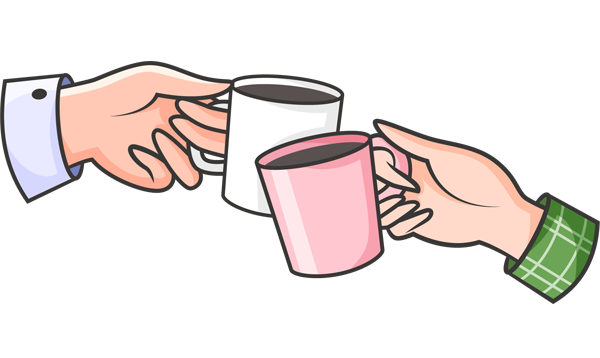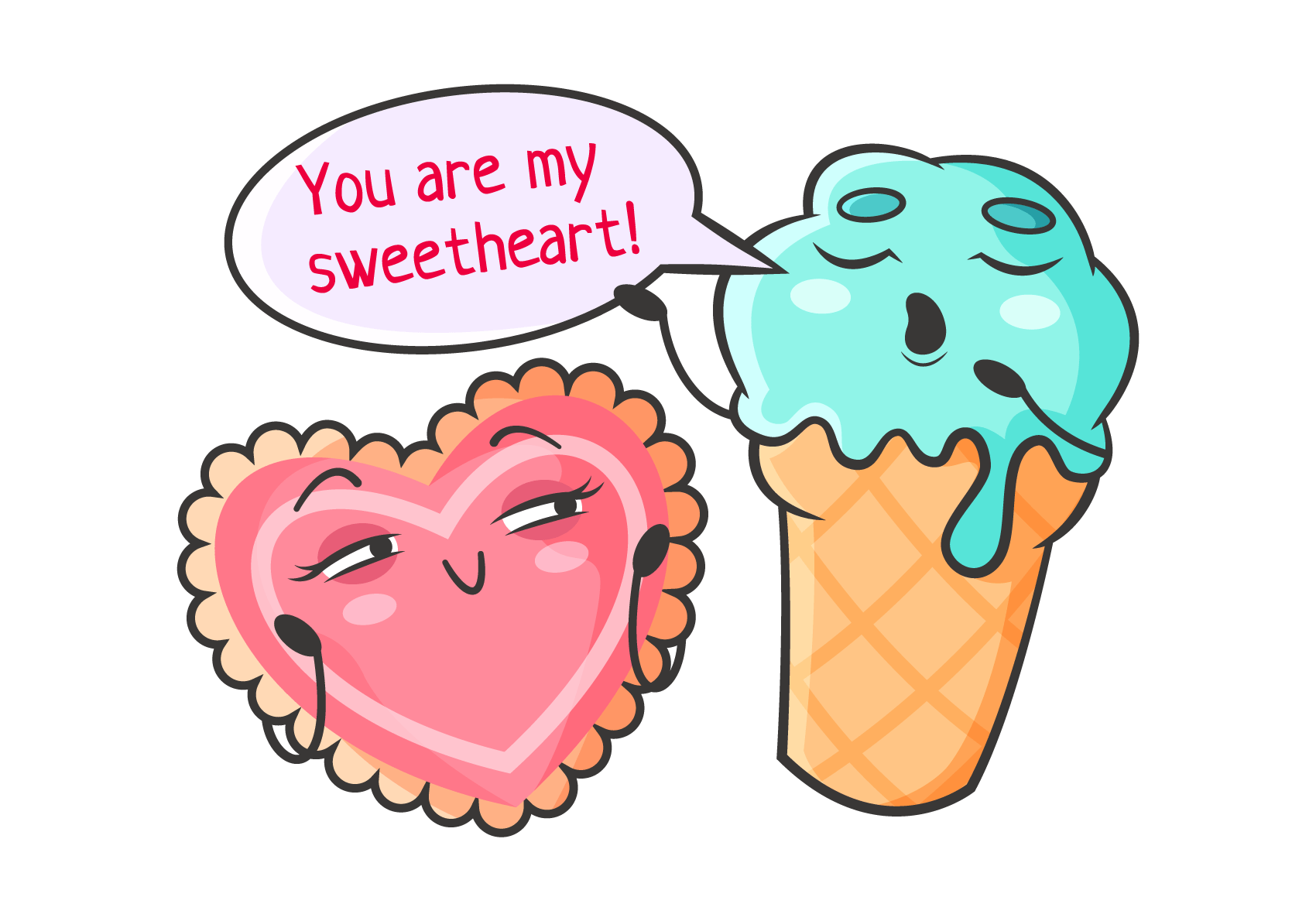Скажи мне, кто твой лучший друг, и я скажу, кто ты. А теперь то же самое, только на английском! Есть трудности? Тогда скорее повторяй слова на тему дружбы на английском языке!
Мы подготовили для тебя список словосочетаний и устойчивых выражений на тему Friendship на английском языке:
Лексика о дружбе на английском:
- 1. True friend [tru frɛnd] – верный друг
- 2. Loyal friend [ˈlɔɪəl frɛnd] – преданный друг
- 3. Real friend [riəl frɛnd ] – настоящий друг
- 4. Fast friends [fæst frɛndz] – близкие друзья
- 5. School friends [skul frɛndz] – школьные друзья
- 6. Childhood friends [ˈʧaɪldˌhʊd frɛndz] – друзья детства
- 7. Old friends [oʊld frɛndz] – старые друзья
- 8. Boyfriend, girlfriend [bɔɪ-frɛnd, gɜrl-frɛnd] – парень, девушка (в отношениях)
Идиомы о дружбе:
- 1. To go through thick and thin [tu goʊ θru θɪk ænd θɪn] – испытать вместе хорошее и плохое, многое испытать, пройти
- 2. To go through hell and high water [ tu goʊ θru hɛl ænd haɪ ˈwɔtər] – пройти сквозь огонь и воду
- 3. Fair-weather friend [fɛr-ˈwɛðər frɛnd] – друг только в благоприятных ситуациях
- 4. Friends in high places [frɛndz ɪn haɪ ˈpleɪsəz] – друзья в высших кругах, выгодные связи
- 5. Circle of friends [sɜrkəl ʌv frɛndz] – круг друзей
Как представить своего друга на английском языке?
- 1. This is my friend… [ðɪs ɪz maɪ frɛnd…] – Это мой друг
- 2. Meet my friend… [mit maɪ frɛnd…] – Познакомься с моим другом
- 3. Let me introduce my friend… [lɛt mi ˌɪntrəˈdus maɪ frɛnd…] – Позвольте представить моего друга
- 4. Get acquainted with my friend… [gɛt əˈkweɪntɪd wɪð maɪ frɛnd…] – Познакомьтесь с моим другом
И еще немного устойчивых фраз напоследок:
- 1. To build bridges [tu bɪld ˈbrɪʤəz] – строить мосты (связи)
- 2. To cross someone’s path [tu krɔs ˈsʌmˌwʌnz pæθ] – случайно столкнуться, встретиться
- 3. A friend in need is a friend indeed [ə frɛnd ɪn nid ɪz ə frɛnd ɪnˈdid] – друг познается в беде
- 4. To make friends [tu meɪk frɛndz] – подружиться, завести друзей
- 5. To be at odds at someone [tu bi æt ɑdz æt ˈsʌmˌwʌn] – быть не в ладах с кем-то
- 6. To be birds of a feather [tu bi bɜrdz ʌv ə ˈfɛðər] – быть из одного теста, одного поля ягоды
А если хочешь учить английский в кругу друзей, лови свой 1-й бесплатный урок в выгодных мини-группах в онлайн-школе FRIENDS💜 Приглашай в группу друга, и вы оба получите по 500 бонусных гривен на изучение английского!
Подпишись, чтобы не пропустить свежие статьи!
Подписаться
«Дружба» по-английски: нескучная лексика
«Друг» по-английски — friend, дружба — friendship. В этой статье вы найдете подборку устойчивых выражений и идиом английского языка для описания дружбы.
They get on well. I have nothing to worry about — Они хорошо ладят. Мне не за что беспокоиться.
He hit off with Julie from the very first day they met — Он подружился с Джули с самого первого дня их знакомства.
We have nothing in common but we remain the best friends — У нас нет ничего общего, но мы остаемся лучшими друзьями.
I don’t believe they’ll ever argue. They are thick as thieves — Я не верю, что они когда-нибудь поссорятся. Они друзья — не разлей вода.
Remember, we got on like a house on fire? — Помнишь, как мы быстро подружились?
Mary and I go back a long way. We’ve known each other since kindergarten — Мэри и я давно друг друга знаем, еще с детского сада.
Are you on friendly footing with your manager? — Ты на дружеской ноге с менеджером?
I fell out with my brother over some stupid things, we haven’t spoken since — Я поссорился с братом из-за каких-то глупостей, и с тех пор мы не разговаривали.
NB! Fall out with (фразовый глагол) — поссориться.
May I rely on you if something happens to me? — Могу я положиться на тебя, если со мной что-то случится?
When so many need somebody we don’t give a helping hand — Когда так многим нужен кто-то, мы не протягиваем руку помощи.
We have grown up. It’s time to make peace — Мы выросли. Пришло время помириться.
You can count on me — Ты можешь положиться на меня.
I never liked your circle of friends anyway — Мне все равно никогда не нравился твой круг друзей.
Helen and I have a friendship of old standing — У нас с Хелен давняя дружба.
How can I believe in friendship when even my best friend is a fair-weather friend? — Как я могу верить в дружбу, если даже мой лучший друг — друг до первой беды.
She got this job because she has friends in high places — Она получила эту работу, потому что у нее есть друзья в «высших кругах».
Узнайте, какие английские идиомы нужно знать для сдачи экзамена IELTS, перейдя по ссылке.
Комментарии
Оставить комментарий
Для комментирования необходимо войти через Вконтакте
Если заглянуть в словарь, вы узнаете, что «друг» по-английски — friend, а «знакомый» — acquaintance. Но это тот случай, когда словарь сообщает сухую информацию, не объясняя культурные тонкости. Возьмем американцев, при общении с ними, вы заметите, что довольно большой круг людей они называют friends, а вот слово acquaintance почти не используют. Складывается впечатление, что у американцев много друзей и мало знакомых. У нас же наоборот: знакомых много, а друзей мало. Это связано с тем, что американцы понимают эти слова не так, как мы.
Кого американцы называют друзьями (friends)?
Мы привыкли называть друзьями тех, кого знаем хорошо и давно, по-настоящему близких людей, а знакомыми — тех, кого знаем не очень хорошо. Приятель — где-то посередине. Словами «друг», «дружба» у нас пользуются аккуратно. У многих взрослых людей друзей немного, в отличие от знакомых и приятелей.
В английском же языке слово friend может подразумевать:
- Друг в нашем понимании, близкий человек, с которым «пуд соли съел».
- Приятель или знакомый (мы бы сказали «знакомый» в этом случае), человек, с которым вы немного общаетесь или общались, но, условно говоря, на День Рождения приглашать не станете.
Американец может познакомиться с кем-то на вечеринке, немного пообщаться, пропустить по стаканчику и тут же сказать, что это мой «friend». Мы в таком случае всегда скажем «знакомый». Но нужно понимать, что и американцы разделяют друзей и приятелей, знакомых (как мы понимаем эти слова), просто могут называть их одним словом. Говоря, что вот этот человек (с которым познакомились на вечеринке) — «my friend», американец подразумевает, разумеется, не «близкий друг», а «приятель, знакомый».
И это понятно всем: ему, знакомому, другому американцу, но может быть непонятно иностранцам (нам, например), не знающим об этой особенности. Мы подумаем: неужели американцы так легко становятся друзьями? Не настолько легко, просто под «friend» не всегда подразумевается «друг» в нашем понимании, вот и все.
Как называть знакомых по-английски?
Мы называем знакомыми и тех, кого едва знаем, и тех, кого видим часто (по работе, например), но до статуса друзей они не дотягивают. То есть довольно широкий круг людей. Знакомых (в нашем понимании) американцы называют либо тоже «friend» (но это, скорее, хороший знакомый, приятель), либо каким-нибудь обходным способом, выражением, например: «someone I know», «a guy/girl I know» и так далее. Например:
I don’t teach English now because of my new job, but there is a guy I know, he might be able to help you. — Я сейчас не преподаю английский из-за своей новой работы, но у меня есть знакомый (букв. «один парень, которого я знаю»), он может тебе помочь.
I haven’t worked in that company but I know some people who work there. — Я не работал в этой компании, но у меня есть там знакомые (букв.: но я знаю людей, которые там работают).
А вот словом «acquaintance» в английском пользуются не так часто. Называя кого-то «acquaintance», подразумевают, что это человек, с которым можно разве что поздороваться, то есть этот человек им не близок и необязательно симпатичен, подчеркивают, что это НЕ друг, а ТОЛЬКО знакомый.
— Is he your friend? — Он твой друг?
— No, just an acquaintance. — Нет, просто знакомый.
«Acquaintance» — это холодное слово, которое отчетливо дистанцирует от упоминаемого человека. Так говорят о ком-то в третьем лице и не в его присутствии.
Одна из «странностей», которые носители английского языка подмечают за Russian speakers — это то, что мы часто используем слово «acquaintance». Для них это так же странно, как и для нас то, что американцы называют «friends» людей, с которыми не съели пуд соли. Вот так и получается, что «friends» у американцев много, а знакомых, вернее, людей, которых они называют «acquaintance», мало (не считают, а именно называют).
Здравствуйте! Меня зовут Сергей Ним, я автор этого сайта, а также книг, курсов, видеоуроков по английскому языку.
Подпишитесь на мой Телеграм-канал, чтобы узнавать о новых видео, материалах по английскому языку.
У меня также есть канал на YouTube, где я регулярно публикую свои видео.
|
to be close to |
[ tu: bi: kləus tu: ] |
быть близкими |
|
|
to rely on |
[ tu: ri’lai ɔn ] |
полагаться на; рассчитывать на |
|
|
to have an argument |
[ tu: hæv æn ‘ɑ:gjumənt ] |
ссориться |
|
|
to get to know |
[ tu: get tu: nəu ] |
знакомиться |
|
|
to realize |
[ tu: ‘riəlaiz ] |
понимать, осознавать |
|
|
to remain |
[ tu: ri’mein ] |
оставаться |
|
|
to get in touch |
[ tu: get in tʌʧ ] |
связаться с |
|
|
to keep up with |
[ tu: ki:p ʌp wið ] |
to keep up with |
|
|
funnily enough |
[ fʌnlɪ i’nʌf ] |
довольно забавно |
|
|
flat mate |
[ flæt meit ] |
сосед по квартире |
|
|
to get rid of |
[ tu: get rid əv ] |
избавиться от |
|
|
an acquaintance |
[ æn ə’kweintəns ] |
знакомый; знакомая |
|
|
a close friend |
[ ə kləus frend ] |
близкий друг |
|
|
to be in touch |
[ tu: bi: in tʌʧ ] |
связаться, быть в курсе дел |
|
|
a generation gap |
[ ə ,ʤenə’reiʃn gæp ] |
разрыв между поколениями |
|
|
a friend of a friend |
[ ə frend əv ə frend ] |
друг друга |
|
|
a workmate |
[ ə ˈwərkˌmāt» ] |
товарищ по работе, напарник, напарница |
|
|
a partner |
[ ə ‘pɑ:tnə ] |
компаньон; партнёр; коллега, напарник, супруг(а); |
|
|
a classmate |
[ ə ‘klæsmeɪt ] |
одноклассник; амер. сокурсник, однокурсник |
|
|
a pen friend |
[ ə pen frend ] |
друг по переписке |
|
|
a true friend |
[ ə tru: frend ] |
настоящий друг |
|
|
a lifelong friendship |
[ ə ‘laiflɔŋ ‘frendʃip ] |
дружба на всю жизнь |
|
|
best mates |
[ best mæts ] |
лучшие друзья |
|
|
to get on well with |
[ tu: get ɔn wel wið ] |
ладить друг с другом |
|
|
to end up falling out with each other |
[ tu: end ʌp ‘fɔ:liŋ aut wið i:ʧ ‘ʌðə ] |
поссориться друг с другом |
|
|
to change his mind |
[ tu: ʧeinʤ hiz maind ] |
передумать |
|
|
a dependable sort of person |
[ ə di’pendəbl sɔ:t əv pə:sn ] |
надежный человек |
|
|
to put up with each other |
[ tu: put ʌp wið i:ʧ ‘ʌðə ] |
мириться с |
|
|
he’s a really nice fellow |
[ hēz» ə ‘riəli nais ‘feləu ] |
он хороший парень |
|
|
to trust with anything |
[ tu: trʌst wið ‘eniθiŋ ] |
доверять что либо |
|
|
to go to smb with every little problem |
[ tu: gəu tu: smb wið ‘evri litl ‘prɔbləm ] |
приходить с любой маленькой проблемой |
|
|
I can always turn to him for help |
[ ai kæn ‘ɔ:lwəz tə:n tu: him fɔ: help ] |
я могу всегда обратиться к нему за помощью |
|
|
I have a very small circle of friends |
[ ai hæv ə ‘veri smɔ:l sə:kl əv frendz ] |
у меня маленький круг друзей |
|
|
to be very special |
[ tu: bi: ‘veri ‘speʃəl ] |
быть особенным |
|
|
a great relationship |
[ ə greit ri’leiʃənʃip ] |
хорошие взаимоотношения |
|
|
to pass on to smb |
[ tu: pɑ:s ɔn tu: smb ] |
to pass on to smb |
|
|
to support the same team |
[ tu: sə’pɔ:t T͟Hē» seim ti:m ] |
болеть за одну команду |
|
|
to make smb laugh |
[ tu: meik smb lɑ:f ] |
смешить |
|
|
he loves playing practical jokes on people too |
[ hi: lʌvz pleiɪŋ ‘præktik(ə)l ʤəuks ɔn pi:pl tu: ] |
он тоже любит разыгрывать людей |
|
|
to have got so much in common |
[ tu: hæv get» səu mʌʧ in ‘kɔmən ] |
много общего |
|
|
we’ve got quite different personalities |
[ wēv» get» kwait ‘difərənt ,pə:sə’nælitiz ] |
мы разные личности |
|
|
to have similar characters |
[ tu: hæv ‘similə ‘kæriktəz ] |
у нас похожий характер |
|
|
to give advice |
[ tu: giv əd’vais ] |
давать советы |
|
|
to share secrets |
[ tu: ʃɛə ‘si:kri:ts ] |
делиться секретами |
|
|
to get a reply |
[ tu: get ə ri’plai ] |
отвечать |
|
|
I really enjoy her company |
[ ai ‘riəli in’jɔi hə: ‘kʌmpəni ] |
мне действительно нравится ее компания |
|
|
to spend a lot of time on the internet, in chat rooms |
[ tu: spend ə lɔt əv taim ɔn T͟Hē» ˈintərˌnet» in ʧæt ru:mz ] |
проводить много времени в интернете, в чатах |
|
|
to meet smb through |
[ tu: mi:t smb θru: ] |
подружиться через |
|
|
to get to know one another |
[ tu: get tu: nəu wʌn ə’nʌðə ] |
знакомиться друг с другом |
|
|
to regret sth doing sth |
[ tu: ri’gret sð du:ɪŋ sð ] |
раскаиваться, сожалеть |
|
| показать еще |

What’s up everyone!
We all know that in every language, there is a variety of words to mean the same thing sometimes, otherwise known as synonyms. The English language is no stranger to this and in many instances has more than one word to describe the same thing. In this post we are going to look at different ways in which we can express the word “friend”.
Mate
The word “mate” is a very British word which means “friend”. It is the most commonly used word in the United Kingdom meaning “friend” and is in fact used in this context more widely than the word “friend” itself. The United Kingdom can’t take all the credit for the usage of this word however as our friends in Australia and New Zealand use this word just as much as the British do. The funny thing is, if you were to say it to a North American, they might not understand it at all.
Buddy
“Buddy” in the United Kingdom is a very popular boy dog’s name, however in the United States, it’s an endearing term for a close friend. This word is, on many occasions shortened to bud which still means the same thing. In the United Kingdom this word is gaining more popularity to mean “friend”, however it is still used much more used in the United States but universally understood.
Pal
Using this word in the United Kingdom is very common indeed and expressions such as “best pal” will often be heard. Outside of the United Kingdom the word is globally understood but not commonly used. If you go to the UK, instead of asking who someone’s best friend is, try asking who their best pal is instead.
Chum
Using “chum” to express the idea of someone as a “friend” is a more old fashioned way to go about it. This word is globally understood but not commonly used. On the other hand, what we may hear more of is its adjective, “chummy”. It is not so unusual to hear someone asking two people if they are “chummy”, although it could also be perceived as having a meaning that may be more than friends.
Bezzie
If someone refers to someone else as their “bezzie”, it implies that the person they are referring to is their best “friend”. Like the other words we have spoken about, this would generally be understood all over the English speaking world. There are however variations of this word such as “bestie” or abbreviations like “bff”, “bffl”, “bbf”.
Are there any other ways?
We are certain that there are many more ways in English to refer to someone as a “friend” and many of them can just be local words. If you know of any more interesting ways and can put them in sentences for us, then we would love to know.
If you would like to learn more fun vocabulary:
Continue Learning about Movies & Television
What is the Comanche Indian word for friend?
The Comanche word for «friend» is haitse.
How do you say the word friend in Finnish?
friend = ystävä
What is the old french word for friend or old friend?
«un ami» is a friend — «un vieil ami» is an old friend.
feminine: «une amie / une vieille amie»
the word «ami» comes from the Latin word «amicus», friend.
What is French word for the English word friend?
The French word for friend is ami if masculine. It’s amie if it’s feminine.
What is the Malayalam word for friend?
Malayalam for friend is «KOOTTUKAARAN» or «SUHRUTH» or’
»CHANGATHI».
Please see that the latter two are not gender specific just as
the word friend.
But koottukaran is male friend.
Расскажем о разнице между английскими словами со значением «друг», «приятель» и «знакомый».
Как на английском обратиться к другу или знакомому: a friend, an acquaintance, a companion, a mate, a buddy, a chap, a fellow или a pal? Сегодня разберем тонкости значений каждого из этих слов и приведем примеры их употребления в речи.
1. A friend
Основное значение слова a friend — «друг».
He’s a family friend. — Он друг семьи.
Другое значение этого существительного — «человек, которому можно доверять».
You can trust us, you’re among friends now. — Нам можно доверять, ты среди друзей.
Также словом a friend называют мецената — человека, который финансово поддерживает благотворительные фонды, социальные организации, деятелей искусства.
The friends of the Royal Academy raised money for the exhibition. — Меценаты Королевской академии собрали деньги для выставки.
В неформальном английском a friend может выступать не только существительным, но и глаголом. To friend означает «добавить в друзья в социальной сети».
I friended her and sent her a message. — Я добавил ее в друзья и отправил ей сообщение.
Приведем несколько распространенных словосочетаний и фраз со словом a friend.
| Словосочетание/Фраза | Перевод |
|---|---|
| a childhood friend | друг детства |
| a close friend | близкий друг |
| a lifelong friend | друг на всю жизнь |
| a trusted friend | верный друг |
| a circle of friends | круг друзей |
| to be in the friend zone | быть во френдзоне |
| to become friends | становиться друзьями |
| to have friends in high places | иметь высокопоставленных друзей |
| to make friends with | подружиться |
| to remain friends | оставаться друзьями |
| A friend in need is a friend indeed. | Друзья познаются в беде. |
| What are friends for? | На что еще нужны друзья? |
| With friends like you, who needs enemies? | С такими друзьями враги не нужны. |
2. A mate
Существительное a mate в значении «друг», «товарищ» используется только в неформальной беседе.
She’s my best mate. — Она моя лучшая подруга.
I’m meeting my mates at seven. — Я встречаюсь со своими товарищами в семь.
В формальной речи a mate употребляется в значении «помощник квалифицированного рабочего».
He was a carpenter’s mate. — Он был помощником плотника.
Изучите подборку словосочетаний со словом a mate.
| Словосочетание | Перевод |
|---|---|
| a chief mate | старший помощник |
| a classmate | одноклассник |
| a mate for life | спутник жизни |
| a room mate | сосед по комнате |
| a soul mate | родственная душа |
| a sparring mate | спарринг-партнер (в спорте) |
| an age mate | ровесник |
3. A pal
Слово a pal — еще один вариант неформального обращения к другу.
It’s my old pal John! — Это мой старый друг Джон!
A pal также используют в обращении к мужчине, который вас раздражает.
Hey, pal, put my things back or I’ll call the police. — Эй, приятель, положи мои вещи обратно, или я позвоню в полицию.
Слово a pal может быть частью фразового глагола: to pal up — заводить друзей, to pal around — проводить время вместе.
Who does Tom pal around with? — С кем Том обычно проводит время?
Nancy palled up with Tom while travelling round South America. — Нэнси подружилась с Томом во время путешествия по Южной Америке.
4. A buddy
Слово a buddy — это еще один неформальный способ обратиться к другу, с которым вы связаны общим делом.
At the university he was my study buddy. — В университете он был моим партнером по учебе.
Также словом a buddy, как и a pal, обращаются к мужчине, который вызывает у вас раздражение. И в то же время a buddy используют взрослые, доброжелательно общаясь с мальчиком.
Buddy, you are very rude! — Приятель, ты очень груб.
Is everything all right, buddy? — Все в порядке, приятель?
Приведем распространенные словосочетания со словом a buddy.
| Словосочетание | Перевод |
|---|---|
| a bosom buddy | сердечный друг |
| a buddy-buddy | навязчивый приятель |
| a study buddy | партнер по учебе |
| a workout buddy | партнер по спорту |
| an old buddy | старый друг |
5. A chap
Слово a chap означает «мужчина», в русском языке его эквиваленты — старина, приятель, парень.
We have a lot in common, old chap. — У нас много общего, старина.
Приведем популярные словосочетания со словом a chap.
| Словосочетание | Перевод |
|---|---|
| a clever chap | умник |
| a funny little chap | чудак |
| an old chap | дружище, старина |
6. An acquaintance
В английском языке словом an acquaintance называют знакомого.
She is more of an acquaintance than a friend. — Она больше знакомая, чем подруга.
В таблице приведем несколько словосочетаний со словом an acquaintance.
| Словосочетание | Перевод |
|---|---|
| a casual acquaintance | случайный знакомый |
| a passing acquaintance | мимолетное знакомство |
| an intimate acquaintance | близкий знакомый |
| an old acquaintance | старый знакомый |
| to make smb’s acquaintance | познакомиться с кем-либо |
7. A companion
Существительное a companion употребляют в отношении человека, с которым вы часто проводите время. Словом a companion можно назвать партнера, приятеля и собеседника.
She is not just my wife, she is my friend, my companion. — Она не только моя жена, она мой друг, мой партнер.
Интересно, что когда-то словом a companion называли молодую женщину, которой в путешествии платили за заботу о пожилом или больном человеке, а теперь a companion относят к любому попутчику.
She went travelling with a female companion. — Она отправилась в путешествие с компаньонкой.
He said I was his best travel companion. — Он сказал, что я его лучший попутчик.
Запомните некоторые словосочетания со словом a companion.
| Словосочетание | Перевод |
|---|---|
| a close companion | близкий товарищ |
| a constant companion | постоянный спутник |
| a female companion | спутница, компаньонка |
| a personal companion | личный спутник |
| a travelling companion | попутчик |
8. A fellow
Слово a fellow означает «приятель», но чаще используется в обращении к коллегам.
His fellow workers refused to support him. — Коллеги отказались его поддерживать.
Еще a fellow — это член педагогического коллектива в колледже или университете.
He is a fellow of the University of Oxford. — Он член Оксфордского университета.
Также словом a fellow называют членов профессиональных объединений.
He is a fellow of the American Film Institute. — Он член Американской киноакадемии.
В таблице привели примеры словосочетаний со словом a fellow.
| Словосочетание | Перевод |
|---|---|
| a clever fellow | умник |
| a decent fellow | порядочный парень |
| a poor fellow | бедняга |
| a research fellow | научный сотрудник |
Хотите преодолеть языковой барьер? Попробуйте направление Speaking в клубе Skills. Вы изучите базовые разговорные конструкции и отработаете их в речи.
Подведем итог: словом a friend называют друга, существительные a mate и a pal переводятся также, но используются в неформальной беседе; a buddy и a chap относят к приятелям; знакомых и собеседников называют an acquaintance и a companion; a fellow употребляют в отношении коллег и членов профессиональных объединений; а словами a pal и a buddy можно обратиться к мужчине, вызывающему раздражение.
Теперь предлагаем пройти тест, чтобы закрепить полученные знания.
Тест по теме «Разница между a friend, a mate, a pal и другими синонимами»
© 2023 englex.ru, копирование материалов возможно только при указании прямой активной ссылки на первоисточник.

“Share your smile with the world. It’s a symbol of friendship and peace.”
Christie Brinkley, an American model, actress and businesswoman
Think about your friend. How would you describe him/her and your friendship? Would you say that birds of a feather flock together (people with the same characteristics or tastes tend to spend time together)? Or would you rather argue that extremes meet (complete opposites often become good friends)?
This article will teach you some useful friend and friendship vocabulary. It will also look at proverbs that might come in handy.
What makes a good friend?
To my mind, a good friend is someone you can count on (rely on, depend on), someone who will stand by you (help and support you) when the going gets tough (in difficult situations).
“My friend is someone who brings out the best in me (makes me behave in the best way possible).” (H.Ford)
Mary is my best friend. She’s a great laugh (she is fun to be with). When I’m down (sad), she always cheers me up (makes me feel happier/less sad).
A true friend will put up with your faults (accept your faults).
“I get by (manage to live/survive) with a little help from my friends.” (J.Lennon and P.McCartney)
“A true friend is one who overlooks your failures (doesn’t notice your failures) and tolerates your success.” (D.Larson)
A good friend is someone who is there (by your side) when you need them, someone who’ll get behind (support/help you) you and won’t let you down (disappoint you).
A good friend is someone you relate to (able to understand the way they feel/think) – someone who shares your interests and sense of humor.
A good friend is someone who livens (laɪvən) up the party (make the party more exciting).
We hope that you are lucky to have a close/bosom (bʊzəm)/intimate/faithful friend or friends, your friendship is truly deep/firm/warm, and you are as thick as thieves (very close). How do you form/establish a lasting/long-standing/lifelong friendship? What friendships do you try to cultivate? And what can spoil/destroy/wreck friendships? People might give many different answers to these questions. But let’s look at the English proverbs below. They are words of wisdom, and so they can help us find answers to the eternal philosophical questions.
ENGLISH PROVERBS ON FRIENDS AND FRIENDSHIP
- A friend in need is a friend indeed.
- A friend’s eye is a good mirror / there is no better looking-glass than an old friend.
- A man is known by the company he keeps.
- Better an open enemy than a false friend / false friends are worse than bitter enemies.
- Familiarity breeds contempt (extensive knowledge of or close association with someone or something leads to a loss of respect for them or it).
- Rick folk (people) have many friends.
- The rich knows not who is his friend.
- It’s good to have some friends both in heaven and hell.
- Little intermeddling (interfering in something that is not one’s concern) makes good friends.
- Long absence and guilt can change a friend.
- Friends are like fiddle strings, they must not be screwed too tight.
- A friend to all is a friend to none.
- A dog is a man’s best friend.
- Lend your money and lose your friend.
SONGS ABOUT FRIENDS AND FRIENDSHIP
“Friends will be Friends” by Queen
See the lyrics here.
Useful vocabulary from the song:
- red letter day – a day that is pleasantly noteworthy or memorable
- to create (British, informal) – to make a fuss / to complain
- the other half – one’s wife, husband, or partner
- lumber (British) – articles of furniture or other household items that are no longer useful and inconveniently take up storage space
- to be through with sth. – done / finished
“Anytime you Need a Friend” by Mariah Carey
See the lyrics here.
Useful vocabulary from the song:
- To close in – to gradually surround, especially with the effect of hindering movement or vision
- To diminish – it becomes reduced in size, importance, or intensity
-
#1
Hello,
I learned from a textbook saying that when people in the UK come across a friend, they say «Wotcha!», or «Ay-up!», is that true?
And do those serve as the same function as «Hi!»?
Many thanks!
Jiung
-
#2
Haha, how old is your textbook? They might be used by some but the traditional is Hello
-
#3
If they were really used, they’d be very informal =)
-
#4
Jiung said:
Hello,
I learned from a textbook saying that when people in the UK come across a friend, they say «Wotcha!», or «Ay-up!», is that true?
And do those serve as the same function as «Hi!»?
Many thanks!
Jiung
They are common greetings in certain areas.
Wotcha is generally London and the Southeast, whereas ay-up is, I think, around Nottingham and possibly Yorkshire.
Ay-up can be used as an interjection to mean pay attention, as in Ay-up, look who’s just walked in.
Hello can be used in the same way, but not wotcha (watch you).
There are many other colloquial greetings, Awriight (All right), Yo, Oi oi, S’appening (What is happening), Wappen (What’s happening), Yawright (Are you all right), Ow do (How do you do), to name but a few. These will depend on the area in which people live, their age, and their background.
-
#5
Well it is certainly true that some of us say things like this in greeting — I am quite fond of «aye-up» myself, but only with friends or maybe my students if I am feeling very relaxed one day. I might even say «wotcha cock» to someone, even though I am not a Londoner, for a slightly comic effect …
It might be useful for you to know this if you are travelling in the UK and hear people use it, or hear it in films of TV shows.
I would advise against attempting to use these terms yourself, unless you’re as fluent / relaxed as a native speaker, otherwise it would seem comical to most «natives».
-
#6
«Ay up!» (or «eh up», «ey up») is still very common, mainly in Yorkshire, and it can be used as a greeting (like «hi», exactly), or as a way of expressing surprise, irony or suspicion, depending on the intonation. You also hear «now then!» used as a greeting. Neither is outdated in this region, but both are fairly informal.
-
#7
Hi Jiung,
I wanted to reply because these people are not really being helpful.
Ay-up is a regional slang that is used very often but mainly in the north of England. You can say it anywhere and will be understood but its not the best thing to use.
Wotcha — please do not use. That is not used by anyone who is not a complete loser. Seriously, not cool. You probably won’t be understood because people will think «no surely she can’t be THAT sad!» And probably think you’re saying ‘watch out’ or something like that.»
So here are a few things that you can say anywhere to anyone.
Hi — this is acceptable and used by everyone at any time except in extremely formal circumstances. But even to a teacher, parent, grandparent, policeman, shopkeeper, interviewer is totally acceptable.
Hi there — this is also used ALL the time. Also can be used even with all the above people. Its like hi but a bit more friendly. I use it all the time. Its nice. Use that.
Hiya — slightly more informal again but still completely acceptable.
Hey — Comes from American influence but being used more and more in the UK. «Hey guys» can be used for friends all the time and includes girls too. «Hey, hows it going?» Is used very frequently. This is something that has come in relatively recently so perhaps just to younger people not old people.
Alright? — This is hello and how are you in one. NB: It does not require a reply such as «yes I’m fine.» The response is «alright» with a nod of the head. This is usually but by no means always used by males. «Alright mate» is informal and used among men and very informal young women.
Morning/afternoon/evening — Take the expression «good morning/afternoon/evening» and remove the «good.» This can be used in almost any situation unless very formal.
Yo / yo yo — very informal. Used in jest but still a fun thing to say in an informal setting.
Wagwan — Very informal slang used amongst the London black community.
Easy? — Very informal slang, spoken as a question but requiring no answer. London slang one can say «easy bruv» meaning how are you brother.
THE LAST TWO ARE NOT TO BE SAID BY FOREIGN PEOPLE UNLESS VERY VERY FLUENT AND WITH A BRITISH ACCENT.
So I hope this helps. Use these and you’ll never go wrong. I recommend Hiya or hi there. These are the best and very friendly ways of saying Hello.
Good luck!
-
#8
markrichardsmith seems to have a be very concerned about class and race when giving people instructions for using the English language. Profanity is considered ill-mannered in some company. However, the words he discusses are not offensive and would only raise concerns with someone like himself who seems to feel that some words belong to some people and therefore ought not to be used by others. This is a curious view of the ever-evolving human phenomenon of language. I can only hope that I haven’t used any words that markrichardsmith thinks ought not to be used by me as I don’t belong a a particular subset of humanity or would end up with me being held in low esteem by those who judge people by their use of a particular vernacular.
-
#9
I might even say «wotcha cock» to someone, even though I am not a Londoner, for a slightly comic effect …
Do not ever say this in the US (just in case anyone thought of doing it…)
-
#10
markrichardsmith seems to have a be very concerned about class and race when giving people instructions for using the English language. Profanity is considered ill-mannered in some company. However, the words he discusses are not offensive and would only raise concerns with someone like himself who seems to feel that some words belong to some people and therefore ought not to be used by others.
Language communicates a lot more than the meaning in the dictionary. You should understand and be concerned with all the possible meanings of what you are saying when in a particular context or group, including class, race, and ethnicity. It’s not only profanity that is an issue concerning group identification and interaction. Saying a greeting that has nothing to do with the context you are in at best would make the person saying it look ridiculous or ignorant, at worst it would cause a negative reaction from the group they are interacting with.
Mark was giving important information that Jiung should be aware of, in order to choose correctly which expression to use in different contexts.
-
#11
I say hello or morning, adding the person’s name if I remember it in time.
I rarely say anything else, and always sound like I’m pleased to see them.
Rover
-
#12
«Ay up!» (or «eh up», «ey up») is still very common, mainly in Yorkshire, and it can be used as a greeting (like «hi», exactly), or as a way of expressing surprise, irony or suspicion, depending on the intonation. You also hear «now then!» used as a greeting. Neither is outdated in this region, but both are fairly informal.
«Now then!»!
Is it used if you see a person and greet him this way like «hello» or «hi»?
-
#13
Markrichardsmith is a newcomer here, and rather rude to say we are not being helpful. Seems to me no-one advised the original poster to use these terms and this discussion about why was perfectly helpful.
On the other hand his suggestion that anyone «foreign» could ever consider saying wagwan is total nonsense. Even if they are very fluent. Wagwan is a Carribean dialect and anyone who is not part of that community and adopts that phrase is likely to sound a complete fool. That applies to British people as well, unless they are really good mates with the Caribbean people they are addressing or have adopted it as a little informal thing within a tight group of friends.
-
#14
Moderator note:
I have no idea why this thread, whose last post was a year and a half ago, was revived apparently only to argue with another member. That is not what we are here for.
The comments have been made, the discussion has run its course, this thread is closed.
Thank you.
Nunty













